The Jewish Practice of Radical Welcoming

The Jewish Practice of Radical Welcoming – Finding Radiance in the Faces of Those with Whom We Disagree
Dr. Bill Robinson
Consider this moment in time between the elections and Thanksgiving. How might we truly and fully welcome friends and family with different political persuasions to our table? This will require us to get radical, in the sense of digging down to the foundational nature of our character and our relationships.
What is radical welcoming? It is the Jewish practice of kabbalat panim, welcoming the face. It involves being fully present to another and accepting into ourselves the radiance that flows from the other’s divine spirit. It’s never easy to stand before another, face-to-face, and not look away. It is even harder when we have fundamental disagreements, or if we fear the other may reject us and the values we hold dearly.
What kabbalat panim asks of us is to break with our idols in order to reconnect with one another – to let go of our “engraved” ethical lines in the sand and those political beliefs that have been “engraved” into our identity. In letting go, it asks us to (re)discover the infinite value of one another, even or especially when we haven’t seen eye-to-eye.
Politics is important. Yet, we cannot rely on our politicians or political parties to bring us earthly redemption or spiritual salvation. Their power for change is but emanations of our own power. Real transformation emerges out of local encounters and the actions of small groups of committed people working together. In acceding too much of our own power as citizens to politicians and political parties, instead of doing the hard work of creating common ground in our communities, we are practicing idolatry.
To say that Biden or Trump will lead us out of the “narrow place” and into the promised land is the same as when the Israelites believed it was Moses himself “who brought [them] out of the land of Egypt.” As a result, when Moses was delayed by one day coming down from the Mountain, the Israelites flew into a panic and asked Aaron to build them a “god” that would go before them. They had acceded their own power to Moses, treating him as an object of (false) worship, instead of finding within themselves the courage and power to transform their lives and enter the Promised Land. [Their continued inability to find this within themselves, as shown in the story of the Twelve Spies, leads God to accept that a new generation needed to arise before the Israelites could enter the Promised Land.]
When Moses saw the Israelites dancing around this Golden Calf, he smashed the tablets that God had inscribed, fearing that these “instructions” would be treated as idols as well. That the Israelites would hew too closely to a set of beliefs and dictates (that they could never live up to), instead of one another and their shared potential for growth. When Moses returned the second time from the Mountain, he came with two tablets inscribed by his own human, fallible hands.
Notably, when Moses also returns, he reveals his face with divine “radiance” shining forth. The people at first “shrank from coming near him.” But, they found the courage to stand vulnerably in Moses’ radiance – to welcome his face – and to accept the obligations that come when encountering another’s face.
In our homes and in our programs, radical welcoming is not just opening our doors. Radical welcoming is not just serving warm food and drink. Radical welcoming is not just asking people how they are feeling. It is all these plus much more. Radical welcoming is coming face-to-face with another in which our vulnerability is shown.
To truly see the face of the other is to welcome their different (unique, equal and infinitely valuable) perspectives and wisdom into the space and into our hearts. When we do this with those with whom we disagree deeply, we discover emanating from them a radiance that is wholly other and yet necessary for us to take in if we are to experience shlemut (wholeness) of individual and community.
One may say that this offers up too much for the sake of building common ground – a type of political surrender. Yet, asking those with whom we disagree to see and accept our own divine radiance – and that of all the diverse “others” in our community and neighborhoods – is the foundation of radical change. It asks of them radical acceptance and mutual obligation. Building common ground (in this way) is the engine for breaking new ground. Kabbalat panim is not just a virtuous way of being with one another. It is the source of foundational personal and political transformation.
In this period of time between the elections and Thanksgiving, regardless of your political views, we are all well aware of the discordance that exists among lifelong friends and family. Political polarization has inscribed us with its idolatrous lines. Because the political has become so defining of who we are, we struggle to hear the voices of those created B’tzelem Elohim (in the image of God) who hold different views and emphasize different values. But, what if we found the courage to meet them face-to-face in an embrace of radical welcome?


